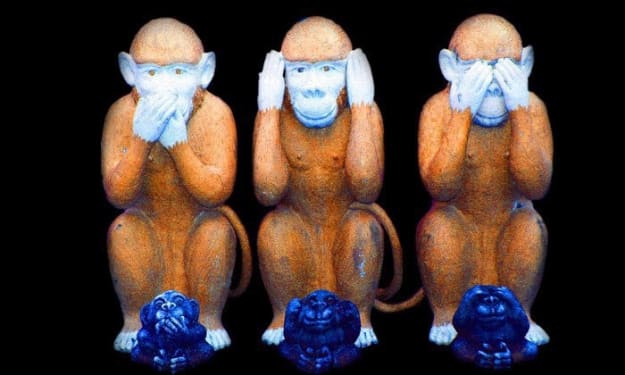The Biggest Threat to American Democracy
What is the biggest threat to American democracy's survival? Let's examine this crucial issue and consider its possible consequences.

Introduction
Political apathy is a significant threat to American democracy. Voter turnout in the United States is abysmal compared to other developed countries. According to data from the OECD, the U.S. ranks 26th out of 32 developed countries regarding voter turnout. Politics apathy is highest among young people, who are least likely to vote. The media doesn't help the situation, with most people getting their news from social media.
So why is voter turnout in the United States so low? And what are the consequences of political apathy?
The consequences of political apathy can be dire. If people don't vote, the wrong people will be in office. Those policies will cause harm to the people if enacted. The country will become more divided instead of coming together to solve problems.
But there is hope. It is possible to combat political apathy despite its prevalence. Educate yourself on the issues and the candidates. Vote. Encourage others to do
The Biggest Threat to American Democracy is Political Apathy
In the 2016 presidential election, only about 55% of eligible voters turned out to vote. The turnout was one of the lowest in recent memory. In comparison, over 80% of eligible voters turned out to vote in countries like Belgium, Sweden, and Turkey. The United States ranks 26th out of 32 developed countries in voter turnout.
Young people are the least likely to vote and the most politically apathetic.
Only 46% of Americans aged 18-29 voted in the 2016 presidential election. Compared to previous generations, this is a huge drop. In contrast, nearly 70% of Americans ages 30-44 voted, and over 60% of Americans ages 45-59 voted. The trend is clear: younger people are far less likely to vote than their elders.
Young people tend to be more apathetic about politics, which may be part of the reason. A study by Harvard University found that only 26% of millennials (defined as those born between 1981 and 1996) said they were interested in politics, as opposed to 40% of Gen Xers (born between 1965 and 1980) and 53% of baby boomers (born between 1946 and 1964).
The media doesn't help the situation, with most people getting their news from social media.
News consumption has changed dramatically in recent years, with social media playing an increasingly important role. A Pew Research Center study found that 62% of American adults get their news from social media. In contrast, 48% of people get their news from television and 24% from newspapers.
Due to this, people are less informed about what's happening in the world. Another consequence is that fake news stories can spread quickly on social media without being vetted by traditional fact-checking sources like newspapers or television news programs.
The Consequences of Political Apathy
The most apparent consequence of political apathy is that if people don't vote, the wrong candidates will win elections, leading to bad policies. Every vote counts, especially in close elections.
Bad policies will harm people.
As a direct consequence of political apathy, bad policies will become law. It's because marginalized groups are more likely to be affected by these policies if they don't vote. For example, poor and working-class people are less likely to vote than wealthier people, so policies that favor the rich are more likely to pass. The result is widening economic inequality and a further decline in living standards for the poor.
The country will become more divided instead of coming together to solve problems.
Apathy towards politics can further divide society as different factions vie for power because of political apathy. When large numbers of people don't participate in politics, it creates an opportunity for special and vested interests to wield disproportionate influence over government policy. The result can be cronyism, corruption, and a decline in democratic trust. As trust in democracy declines, so does participation in democratic institutions like voting. All sectors of society must increase their political engagement to break this vicious cycle.
Combating Political Apathy
To make an informed decision, you should familiarize yourself with the issues that are important to you and the stances of the different candidates. You can do this by reading up on websites like ProCon.org, which provides unbiased information on hot-button topics, or by attending local town hall meetings and listening to what the candidates say firsthand.
Vote
Voting is crucial to combating political apathy! Every vote counts, whether for local school board members or the president of the United States. If everyone eligible to vote voted, we would see a very different landscape in America.
Encourage others to vote
Another way to combat political apathy is by encouraging those around you to get involved in the political process. You can do this by talking to friends and family about how voting is essential or registering new voters yourself. Whatever method you choose, getting others engaged in the political process is critical to ensuring our democracy remains strong.
Conclusion
The biggest threat to American democracy is political apathy. Too many people don't vote, and as a result, the wrong people are in office. Consequently, governments implement bad policies that hurt people. The country becomes more divided instead of coming together to solve problems.
To combat political apathy, we must educate ourselves on the issues and the candidates. We need to vote. And we need to encourage others to do the same. Otherwise, our democracy will continue to decline.
__________________
Hi, Folks. Get a FREE Subscription to The Write Stuff, and receive my daily article, essay, short fiction, or poetry delivered directly to you. Just select the Free Subscription Plan option. Thanks for supporting my writing efforts!
__________________
Thank you for reading. (Copyright Terry Mansfield. All rights reserved.)
Worth checking out:
- Four Threats: The Recurring Crises of American Democracy
- The Government-Citizen Disconnect
- How Democracies Die
- Amazon Deals (updated hourly)
NOTE: The bulleted items above contain affiliate links. If you use my affiliate link, I may earn a small commission, which will help support my ongoing writing efforts.
About the Creator
Terry Mansfield
Trying to be the best writer I can be. Specialist in eclecticism.






Comments
There are no comments for this story
Be the first to respond and start the conversation.